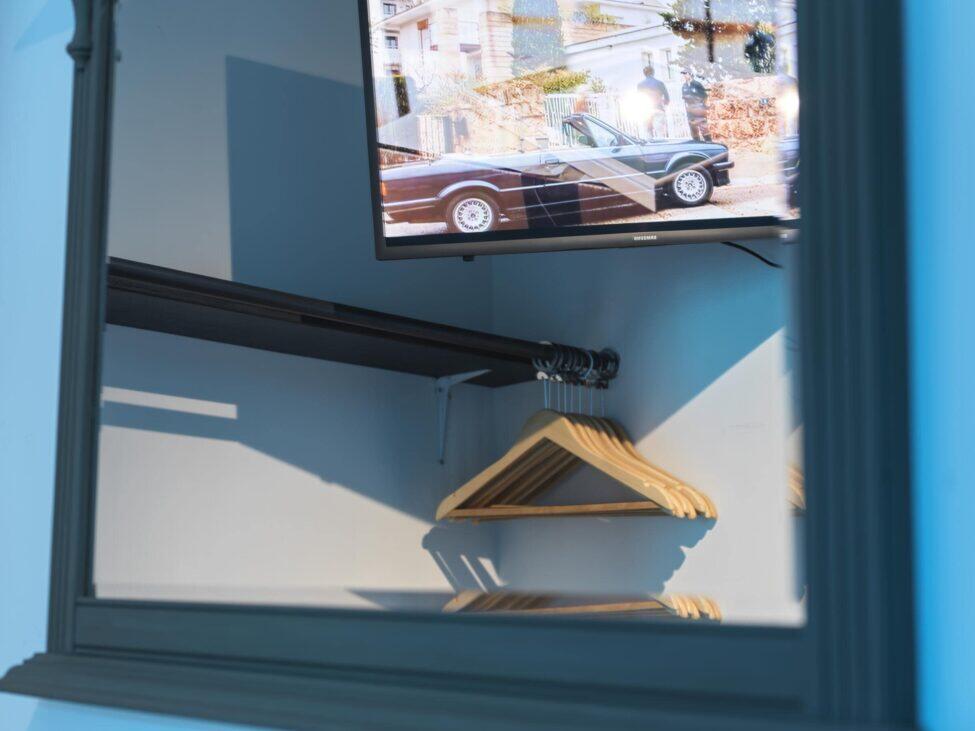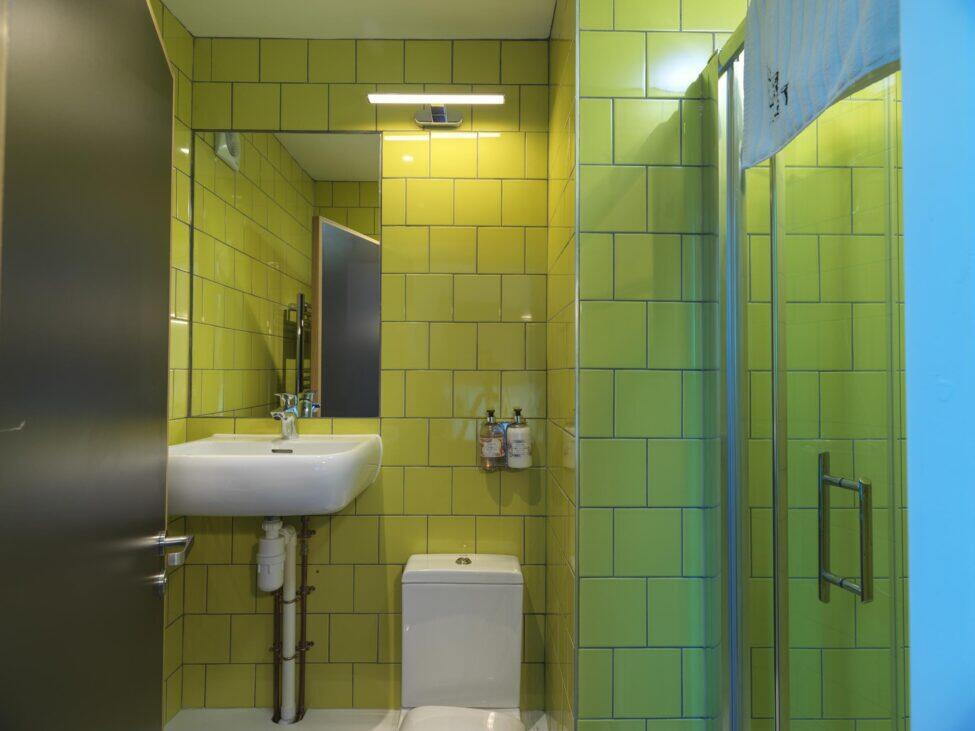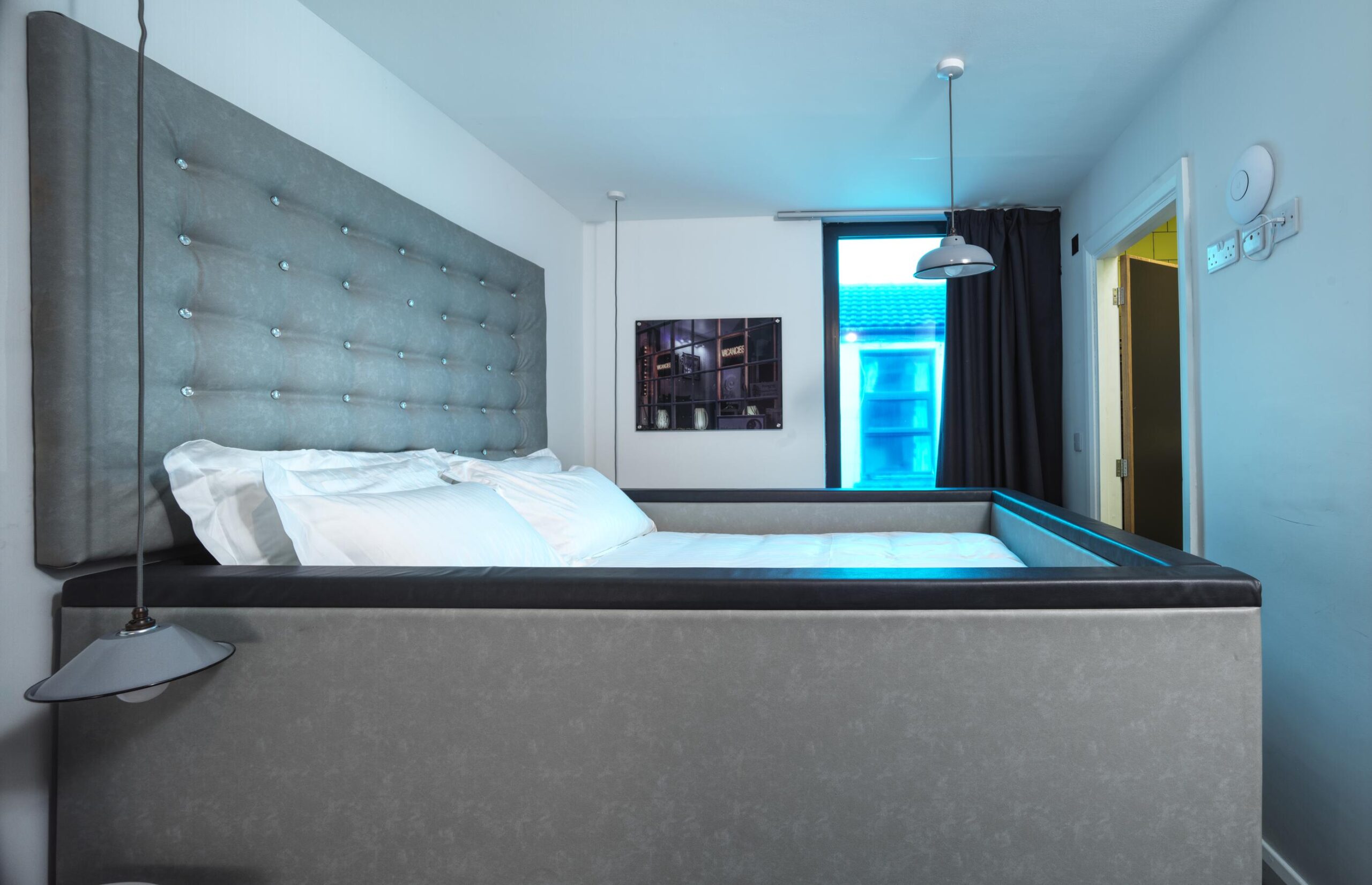With whimsy and wit, this hotel room shows the struggles of traveling with a disability.
Whether bounding quickly off a train or slaloming through the bustling streets of a lively neighborhood, I’ve always taken my mobility for granted. Rarely do I think of what my travel experiences would look like if my mobility were compromised. How would my ability to hike up an ancient hill or climb the steps of a medieval castle suddenly be limited? For all the buccaneering spirit that engulfs us when we rush out of an airport and into a pulsating new city, we don’t often stop to consider how the act of travel isn’t available to everyone. At least not in the same fashion.
Located in the British coastal town of Blackpool and designed by Leicester-based artist Christopher Samuel, the (ironically titled) Welcome Inn room at ART B&B offers a humorous yet thought-provoking window into the world of traveling with a disability. Opened in 2020, and eschewing what you might expect from a typical hotel, each room at ART B&B is designed by a different artist. The rooms are unique, exploring everything from wild abstract ceiling panels to colorful art deco murals that celebrate the faded glamor of Blackpool’s former life as the country’s premier entertainment hub. Samuel’s room, however, offers a very different experience.
While the website reassuringly proclaims that everything functions correctly in the Welcome Inn room, some of its features sounded so fiendishly annoying that my curiosity was piqued enough to visit and see the notorious room for myself, in all its exasperating glory. As I walked up ART B&B’s old Victorian staircases to the Welcome Inn room, I was ominously reminded that Samuel—who uses an electric wheelchair—isn’t able to see the room he designed.
Recommended Fodor’s Video
“As a person who normally avoids hotels because of my high access needs, I was forced to experience what it is like to face access barriers in a place many people go to relax and enjoy,” explained Samuel, just before the hotel opened. “This, in turn, got me interested in what other disabled people’s experiences of hotels might be, something I want to recount through this installation.”
The first thing you notice on entering the Welcome Inn room is the three-foot-high lip encircling the bed like a moat, making it difficult to traverse. In fact—as I found out the following morning—”rolling out of bed” is hitherto impossible, and a degree of physical strength is needed to awkwardly scramble in and out of its comfortable bosom. It’s also a pretty small room, which only magnifies its myriad of inconveniences.

I couldn’t help but laugh when seeing the flat-screen TV facing away from the bed and towards the mirror on the sidewall. Should you want to watch anything on the TV, you can either squint at the less-than-ideal portion of the screen available or watch it through the mirror, which despite being perfectly fine, gets weird quickly.
Equally amusing are the bedside table lamps that hang down from the ceiling to a point far below the bed, thus rendering them virtually useless for reading. Also at an annoyingly low level are the light switches. With the regular switches covered up, I had to bend over and almost reach down to the floor to use the functioning ones.
“On the surface level, [the room is] quite playful and theatrical,” explains Samuel. “But it’s real.”
It doesn’t get more real than the bathroom and its excruciating arrangement, where the privacy you’d typically take for granted simply isn’t an option. The design of the small bathroom is such that any attempt to close the door is met with a thud as it collides with the toilet bowl, leaving the bathroom wide open for all to see. Thankfully, I was on my own but sufficed to say that any couple wishing to spend a night in this room will have to be very comfortable with each other.
In contrast to the light switches sitting by the foot of the door, the sink in the bathroom is placed a little too high up for comfort. That height dynamic is something that Samuels enjoyed playing with in his design.

“Anyone with wheelchairs will know that when we go to places that have tables and chairs, a lot of the time you can’t get under them, or they’ll be too high, or there’s a bar in the middle of the table, so you have to position yourself to the side,” Samuel says. “It’s little things like that.”
While Samuel is all too familiar with these sorts of everyday struggles, it made me reconsider what I’d usually consider an irritation during a hotel stay and just how frivolous they were.
Perhaps one of the most eye-opening parts of the experience in the Welcome Inn room was the relentless energy exertion of clambering in and out of bed across that three-foot lip. More than anything, it was the physical effort to do something that’s seemingly such a rudimentary part of life. Grabbing a glass of water before going to bed turned into a highly frustrating activity. It made me want to be more sedentary—a feeling that I rarely get—making me feel belatedly appreciative of the mobility that I have.
The Welcome Inn isn’t a room designed to garner 5-star reviews, but it makes its point with wit and warmth. Annoying as it may be, it has changed my perspective on the physical nature of travel and the accessibility barriers that many people face. And for that, I’m thankful.
Stayed in a hotel and booked accessible room. My husband is in a wheelchair after suffering a stroke that left one half his body not functional. Bed was too high and no space to get a wheelchair to the side of the bed near the bathroom. We both struggled to lift him onto the bed by moving a chair next to the bed. Put one leg on the chair and I hoisted him (almost threw him onto the mattress). No way to take a shower or bath as there were no grab bars. Got a bowl bath instead. Whew. I had accidentally left my hotel key in the room and had a desk clerk open the door for us. Charged us an extra $50 for that service. Next time I will make sure to ask all the questions about an accessible room before booking. Lesson learned.




Accessible? How is anyone supposed to get into that bed?